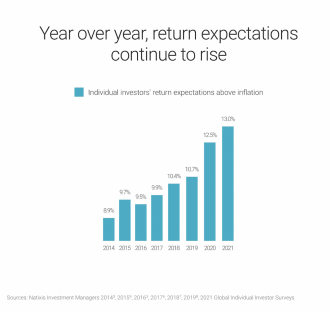On a recent mastermind call I hosted for advisors we discussed the challenge that investing may appear easy to investors, thus lessening the perceived value of a plan and an advisor. Investing is easy – for the rational investor. But not the human investor.
It’s a Misperception
Such misperception is understandable given the duration of the bull market, advent of meme stocks and instant millionaires on Robinhood. The “Corona Crash” last March was too short lived and rebounded too quickly for investors to feel real pain. For all but the few who sold, it’s more of a blip in a very long bull market.
There are also many stories of inexperienced and uneducated “investors” striking it rich with meme stocks and cryptocurrencies. There may be a sense that anyone can win at this. So why pay an advisor or adhere to a plan that continues to underperform (due to its diversified nature)?
Expectations are Crazy
Natixis recently surveyed over 8,000 investors around the world and found that, on average, they expect real annual returns of 14.5% of the long term. US investors specifically are even worse. They expect 17.5% annually. Usually investors will anchor to long-term past performance, but now they are just unrealistic.
You can see from the graphic below that expected returns have grown considerably over the years. This is not an encouraging trend.

Why We Should Care
An advisor I work with recently reported having lost a very good client. It came out of nowhere. They appreciated the planning and everything he did up to this point, but was ready to take it over. It is likely the perceived ease of investing influenced this decision.
Advisors that react rather than proact may end up losing a few clients. This is a wake up call to what is going on right now. Investment returns seem easy and there may be little perceived value in a portfolio strategy and/or plan.
What to Do About It
There are only two potential outcomes for us: do nothing or do something. Doing nothing means you are hoping for a significant correction that lasts many months so investors can be humbled. It takes real pain to recalibrate expectations and bring investors back to the fundamentals of investing.
Doing something is about having proactive discussions with clients. They need to understand everything that goes into to making wise investment decisions, how psychology plays into it and how a few simple decisions can make or break someone’s future. Clients may not be naturally seeing it right now because of how easy things appear. Communicating such an important message can be a real challenge for advisors because there is a lot involved. Messaging sequence and flow is very important so others understand it to the same degree you want them to.
I recently developed a seminar for advisors in The Behavioral Finance Network called Investing Essentials. It gives the entire communication message in slides that an advisor can give as a seminar, webinar or just use a few of the slides as talking points in a meeting. As you create your own talking points, be specific with examples how a plan and your advice help your clients. Discuss the nature of decision making, the psychology behind it and how you help your clients with it. Ultimately, it is important that clients perceive the value, not because you told them it is a value, but because you communicated it in a way that it was personalized to them.
Related: A Financial Plan Is Not Enough


